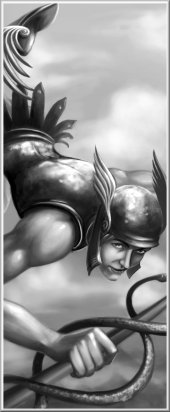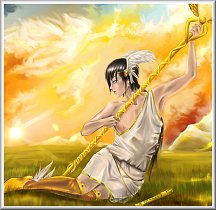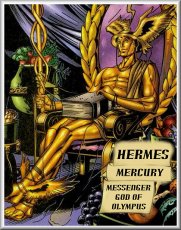
Hermes
CLICK
TO ENLARGE

Hermes
CLICK
TO ENLARGE

Hermes
CLICK TO
ENLARGE
|
HERMES PAGE ONE
Hermes is the son of Zeus and Maia, daughter of the Titan Atlas,
and was born in a cave on mount Cyllene in Arcadia. That's why
he is often called Atlantiades or Cyllenius.
He is the fastest of the gods, and his principal position was as
messenger to Zeus and all the other gods. He was also the Divine
Herald, the solemn guide who knew the road to hell and would
lead the souls of the dead down to the Underworld, after
Thanatos (Death) did his job.
That's why he was also called Psychopompus, a name given to him
for being the guide of souls to the Underworld.
Clever Hermes is also the Greek god of Commerce and the Market,
and thus the patron of traders, merchants and thieves. His
distinguishing qualities were cunning, ingenuity, knowledge and
creativity.
His realm included Gymnastics; he was the patron of all
gymnastic games in Greece, and gymnasia were under his
protection.
The Greek artists derived their ideal of the god from the
gymnasium and thus they represented Hermes as a handsome youth
with beautiful limbs harmoniously developed by athletic
exercises and gymnastic excellence.
Believed to be the inventor of sacrifices, Hermes was the
protector of sacrificial animals. He is often mentioned in
connection with Pan and the Nymphs, who were spirits of nature,
and the shepherds worshipped him.
This versatile god had a hand even in administering Good Luck,
presiding over games of chance such as dice. He was also the
shrewdest and most cunning of all the gods, the master thief who
began his career before he was one day old, by stealing Apollo’s
herds.
A few hours after his birth the mischievous infant escaped from
his cradle and traveled to Pieria, where he saw the splendid
herds of Apollo and decided to take them.
Carrying off some of the finest of his half-brother's renowned
cattle, the infant Hermes returned to his native Arcadia. The
cunning child made the cattle walk backwards to obscure their
tracks!
Hermes bribed a man named Battus, who had seen him, to be
silent. Sacrificing two of the stolen animals, he divided them
into twelve parts for the twelve great gods of Mount Olympus,
hiding the rest of the herd.
It was this cheeky and brazen theft that won young Hermes
recognition as a god himself.
Finding a tortoise outside his cave, Hermes further displayed
his godly talent by placing strings across its shell, thus
inventing the lyre. He sat there sweetly playing this marvelous
new instrument, happy as a baby god could be.
Meanwhile Apollo, using his prophetic powers (not to mention the
fact that Battus did not keep his word, but had revealed the
secret), had discovered the identity of the cattle thief and
promptly arrived at Cyllene, confronting baby Hermes and
charging him with the crime.
He said:
"Child, lying in the cradle, make haste and tell me of my
cattle, or we two will soon fall out angrily. For I will take
and cast you into dusky Tartarus and awful hopeless darkness,
and neither your mother nor your father shall free you."
Apollo to Hermes - Homeric Hymn to Hermes
The child's mother, Maia, was perplexed at Apollo's accusation
of her son, and pointed out the infant snug in his cradle,
innocently sleeping like a baby. There's no way such a sweet
child could perpetrate the crime he was accused of, Maia said.
Apollo would have none of that, and he carried the baby to Zeus,
who judged the infant guilty as charged and ruled that Hermes
would have to return the stolen cattle to their rightful owner.
But just then Hermes began to play on the lyre he had crafted,
and Apollo was so charmed by the exquisite sound that the god of
music allowed the child to keep the animals. Hermes in turn
gifted the lyre to Apollo, and in no time the two were great
friends.
 CONTINUED ON PAGE TWO
CONTINUED ON PAGE TWO

Hermes continues on page two!
Lots more info and pix - Click here!

[home] [page one]
[page two]
|







